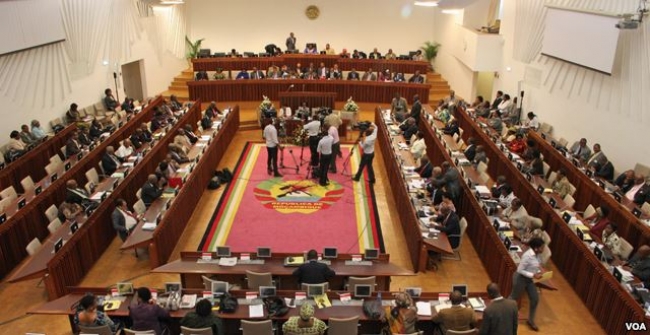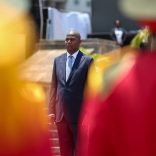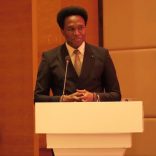Mozambique: Daniel Chapo begins six-day US visit, JD Vance meeting and ExxonMobil on agenda
Assembly passes 2018 plan and budget; all opposition MPs voted against – AIM report

RM (File photo)
The Mozambican parliament, the Assembly of the Republic, on Thursday approved the government plan and budget for 2018, with all opposition deputies voting against.
The plan, debated on Monday and Tuesday, envisages growth of 5.3 per cent in the Mozambican GDP in 2018, and a rise in the country’s exports from this year’s projection of 3.463 billion US dollars to 4.122 billion – an increase of 19 per cent.
Since imports are expected to remain much the same in the two years (5.453 billion dollars), the balance of trade should improve significantly. The trade deficit should shrink from 2.19 billion dollars in 2017 to 1.331 billion in 2018.
The plan also envisages an increase in the government’s net international reserves from 2.181 billion dollars this month to 2.202 billion dollars at the end of 2018 – enough to cover six months’ imports of goods and non-factor services (excluding the imports of the foreign investment mega-projects).
The main opposition criticism of the plan hinged on the small number of teachers to be recruited for the 2018 school year. Initially the plan envisaged only recruiting 2,213 teachers – a dramatic decline on the over 8,000 recruited at the beginning of 2017.
But in the final version of the plan, the government promised an extra 3,000 teachers, bringing the number to be recruited up to 5,213. The money to pay these extra teachers would be found from resources made available by “rationalising public expenditure” – a reference to reducing the perks and privileges of high ranking state officials (including various rent, transport, fuel and communications subsidies). The government estimates that these cuts could save 7.2 billion meticais (about 120 million US dollars) a year.
The resolution approving the plan was passed on its first reading by 133 votes to 84. All the deputies from the ruling Frelimo Party in the chamber voted in favour, and all deputies from the Renamo rebels and from the Mozambique Democratic Movement (MDM) voted against.
The Assembly moved straight onto a second reading, voting on the resolution article by article. As happens every year, Renamo introduced a wrecking amendment, trying to change the words “the 2018 plan is approved” to “the 2018 plan is rejected”.
Since the Assembly had already voted to approve the plan, this amendment was a procedural monstrosity, which should have been thrown out. Long experience, however, has shown that it takes less time just to vote such amendments down, rather than getting into a debate over correct procedure. The amendment was thus defeated by the same margin of 133 votes to 84.
In declaring Renamo’s reasons for its amendment, Americo Ubisse claimed that the plan “legalises the illegal” and was intended to protect those who had organised the illicit loans of over two billion dollars to three security-related companies in 2013 and 2014. He also claimed that high growth rates in the Mozambican economy are always “false” and “are never reflected in the lives of Mozambican citizens”.
The 2018 budget was passed by a similar margin – a few deputies had entered or left the chamber, so 136 Frelimo deputies approved the budget and there were 83 Renamo and MDM votes against it.
The budget envisages total public expenditure of 302.9 billion meticais (5.05 billion US dollars). The state revenue forecast is 222.9 billion meticais, leaving a budget deficit of 80.1 billion meticais. The government hopes to cover this deficit with 60.9 billion meticais in foreign resources and 19.2 billion in domestic resources.
Once again Renamo claimed that the budget prioritises defence and security rather than education and health. MDM deputy Armando Artur made the same claim, alleging “the option of this government is war. Money is being channelled to the repressive sectors”.
His MDM colleague Venancio Mondlane was even more extreme, claiming that the budget was “a holocaust”, because it supposedly “generates poverty and injustice” and marginalises agriculture. He said it would turn Mozambique “into a concentration camp”.
But anybody with a pocket calculator can work out how much of the budget is going to which sectors.
63.4 per cent of the public expenditure in the budget, once debt servicing and financial operations have been excluded, will be spent on economic and social sectors. Education takes the largest share at 22.6 per cent, followed by roads (13.2 per cent), health (11.5 per cent), agriculture and rural development (5.7 per cent), water supply and public works (3.1 per cent), social welfare and labour (2.9 per cent), the judicial system (1.6 per cent), and mineral resources and energy (1.3 per cent).
In comparison, all the defence and security sectors taken together – Ministry of the Interior (including the police), the Defence Ministry and the armed forces, the presidential guard (“Casa Militar”), and the State Security and Intelligence Service (SISE) – receive 9.6 per cent of the budget.












Leave a Reply
Be the First to Comment!
You must be logged in to post a comment.
You must be logged in to post a comment.